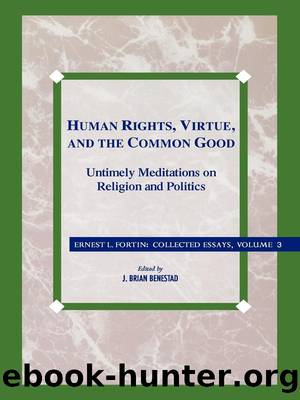Human Rights, Virtue and the Common Good by Father Ernest L. Fortin

Author:Father Ernest L. Fortin
Language: eng
Format: epub
ISBN: 9781461637523
Publisher: Rowman & Littlefield Publishers
Published: 2013-07-10T16:00:00+00:00
CHRISTIAN FAITH AND MODERNITY
Thus far I have spoken exclusively of the rapport between modern thought and classical thought. It is obvious that one cannot deal adequately with the problem of modernity without raising the issue of its relation to the other great fountainhead of the premodern tradition, biblical religion. Just as modernity, as I have defined it, implies a rejection of classical philosophy, so it has come to be identified with a rejection of revealed religion and, at the limit, of any form of transcendence. By the end of the eighteenth century, this fact, long acknowledged by a small group of perspicacious thinkers, had become a matter of common concern among theologians. From this moment, unsurprisingly, date the first significant attempts to bridge the widening gap between Christianity and secular thought.
The distinctive feature of the theology that makes its appearance at this time is precisely its openness to modern thought and its willingness to be guided by it in its investigations. Its first great exponent was Schleiermacher, the title of whose book, On Religion: Speeches to Its Cultured Despisers, conveys as well as anything else the author’s main preoccupation.14 Schleiermacher’s work inaugurated a trend that has persisted in one form or another down to our time and that has yielded in turn a romantic, an idealist, a positivist, and an existentialist theology, to mention only a few of its better known avatars. Its most illustrious and by far its most numerous representatives were Protestants, but they had their opposite numbers on the Catholic side in such scholars as Moehler, Sailer, Hirscher, Scheeben, and Passaglia, whose pioneering work has lately begun to attract a good deal of attention.
The new theology enjoyed its euphoric moments, particularly during its heyday in the nineteenth century, but it has also experienced its stations of the cross and silent agonies. For one thing, its efforts to come to terms with the modern world appear to have left the intellectual giants of the period (Goethe, Hegel, Nietzsche) singularly unimpressed. For another, it did not always escape the danger to which it exposed itself by engaging in debate with secular thought. In its desire to be timely, it often ceased to be timeless; in its quest for relevancy, it tended to lose sight of its traditional substance. Nineteenth-century evangelical theology is thought to have reached its peak in 1900 with the publication of Harnack’s What is Christianity? It died fifteen years later when its new leader, Ernst Troeltsch, gave up his chair of theology at the University of Heidelberg for a chair in philosophy at Berlin. What had begun as a generous attempt to win back a prodigal and long-lost child had seemingly ended in an all but complete sell-out of Christianity to the modern world. In the opinion of many, a similar fate befell certain segments of the Roman Catholic community at the time of the Modernist crisis toward the beginning of this century.
The confrontation between Christianity and the modern world undertaken by Schleiermacher and pursued by his followers represents only one response to the challenge of modernity in the nineteenth century.
Download
This site does not store any files on its server. We only index and link to content provided by other sites. Please contact the content providers to delete copyright contents if any and email us, we'll remove relevant links or contents immediately.
What's Done in Darkness by Kayla Perrin(25500)
Shot Through the Heart: DI Grace Fisher 2 by Isabelle Grey(18219)
Shot Through the Heart by Mercy Celeste(18160)
The Fifty Shades Trilogy & Grey by E L James(17774)
The 3rd Cycle of the Betrayed Series Collection: Extremely Controversial Historical Thrillers (Betrayed Series Boxed set) by McCray Carolyn(13189)
The Subtle Art of Not Giving a F*ck by Mark Manson(12912)
Scorched Earth by Nick Kyme(11832)
Stepbrother Stories 2 - 21 Taboo Story Collection (Brother Sister Stepbrother Stepsister Taboo Pseudo Incest Family Virgin Creampie Pregnant Forced Pregnancy Breeding) by Roxi Harding(11040)
Drei Generationen auf dem Jakobsweg by Stein Pia(10217)
Suna by Ziefle Pia(10186)
Scythe by Neal Shusterman(9259)
International Relations from the Global South; Worlds of Difference; First Edition by Arlene B. Tickner & Karen Smith(8608)
Successful Proposal Strategies for Small Businesses: Using Knowledge Management ot Win Govenment, Private Sector, and International Contracts 3rd Edition by Robert Frey(8419)
This is Going to Hurt by Adam Kay(7695)
Dirty Filthy Fix: A Fixed Trilogy Novella by Laurelin Paige(6453)
He Loves Me...KNOT by RC Boldt(5804)
How to Make Love to a Negro Without Getting Tired by Dany LaFerrière(5378)
Interdimensional Brothel by F4U(5304)
Thankful For Her by Alexa Riley(5161)
